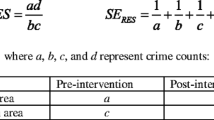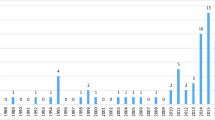Abstract
Over the past three decades, the public outcry over the incidence of police corruption in Nigeria has increased despite concerted efforts to reform the police and improve their service delivery. Of recent, the public resentment of police involvement in street corruption, abuse of crime suspects, and extra-judicial killings has caught the attention of the international community and led to human rights groups’ agitation for the overhauling of the police particularly the Special Anti-Robbery Squad (SARS). This study was conducted to investigate the experience of police corruption, specifically extortion and victimization, among commercial drivers in Lagos metropolis. The study sought to know whether the nature of service rendered by the commercial drivers and their level of education are associated with police extortion and victimization. It also investigated other possible predictors of exposure to police extortion. The study was carried out among taxi drivers, commercial bus drivers, motorcyclists, and tricyclists in Ikeja, Mushin, and Somolu local government areas of the state. The study adopted cross-sectional survey design and mixed method of data collection. Multi-stage sampling and convenience sampling techniques were adopted. A sample size of 300 was chosen. Structured questionnaire, observation, and in-depth interview guide were used to gather data from participants. It was found that the nature of service rendered by the commercial drivers were associated with both experience of victimization (χ2 13.229; p = 0.004) and police extortion (χ2 = 9.630; p = 0.022), while the level of education was not significant. Ethnicity and encounter with police were other significant predictors of exposure to police extortion.
Similar content being viewed by others
References
Adegoke N (2014) Factors influencing Nigerian police performance: a case study of zone two Nigerian police headquarters, Lagos. Glob J Appl Manag Soc Sci 7:16–24
Alemika EEO (1993) Colonialism, state and policing in Nigeria. Law Soc Change 20:187–219
Alemika EE (1998) Policing and perceptions of police in Nigeria. Police Stud 11(4):161–176
Altbeker A (2005) The dirty work of democracy: a year on the streets with the SAPS. Cape Town, Janathan Ball
Amnesty International (2014a) Welcome to hell fire: torture and other ill-treatment in Nigeria. Amnesty International Publications
Amnesty International (2014b) Welcome to hell: torture and other ill-treatment in Nigeria, London: Amnesty International
Andvig, JC, Fjeldstad O-H (2008) Crime, poverty and police corruption in developing countries, CMI Working Paper 2008:7, CMI Michelson Institute
Ayee JRA (2016) Reducing police corruption and promoting police professionalism through reforms in hope, Kempe Ronald police corruption and police reforms in developing societies. CRC Press, Taylor and Francis
Bruce D (2012) The law for sale: the endemic corruption in the Johansburg metropolitan police department. Corruption Watch, Johannesburg
Chene M (2010) Anti-corruption and police reform, transparency international, http:www.transparency.org
Ekeh PP (1975) Colonialism and the two publics: a theoretical statement. Comp Stud Soc Hist 17(1):91–112
Enkeremadu D (2017) Police corruption and internal security in Nigeria. Afr J Psychol Stud Soc Issues 20(2):100–116
Forkum PN (2016) Cameroon: police corruption and police reforms imperative in hope, Kemper police corruption and police reforms in developing societies, CRC Press, Taylor and Francis
Hope KR (2015) Police corruption and police reforms in developing societies, CRC Press, Francis and Taylor
Human Rights Watch (2010) Everyone’s in on the game: corruption and human rights abuses by the Nigeria police force. Human Rights Watch, USA
Ivkovic SK (2003) To serve and collect: measuring police corruption. J Crim Law Criminol 93(2):593–650
Jackson J, Asif M, Bradford B, Zakar, MZ (2014) Corruption and police legitimacy in Lahore, Pakistan. Br J Criminol 54(6):1–22
Jessen S (2014) Conflicting logics of exceptionality: new beginnings and the problem of police violence in post-apartheid South Africa. Dev Chang 45(3):458–478
Loiuse P, Celia W (2009) A multinational model of police deviance: examining the nature of police corruption, crime and misconduct. Polic Soc. https://doi.org/10.1080/10439460802457719
Mbaku JM (1994) Bureaucratic corruption and policy reform in Africa. J Soc Polit Econ Stud 19(2):147–175
Mbaku JM (2016) Confronting police corruption in developing societies: the role of the rule of law in hope, Kempe Ronald police corruption and police reforms in developing societies, CRC Press, Taylor and Francis
McCafferty FL, Souryal S, McCafferty AM (1998) The corruption process of a law enforcement officer: a paradigm of occupational stress and deviancy. J Am Psychiatry Law 26(3):433–458
Newham G (2002) Tackling police corruption in South Africa. Center for the Study of Violence and Reconciliation, Johanesburg
O’Hara P, Sainato VA (2015) Monetizing the police: corruption vectors in agency-managed off-duty work. Polic Soc 34(2):151–164
Oleinik A (2016) Corruption on the road: a case study of Russian traffic police. IATSS Res 40:19–25
Oluwaniyi OO (2011) Police and the institution of corruption in Nigeria, policing and society. International Journal of Research and Policy 21:67–83.
Peiffer C, Rose R (2018) Why are the poor more vulnerable to bribery in Africa? The institutional effects of services. J Dev Stud 54:18–29
Roelofse C (2016) South Africa: a schizophrenic system for combating the scourge of police corruption in hope, Kemper police corruption and police reforms in developing societies, CRC Press, Taylor and Francis
Seligson MA (2002) The impact of corruption on regime legitimacy. A comparative study of four Latin American countries. J Polit 64(2):408–433
Seri G (2016) Argentina: revisiting police corruption and police reforms in a captive state in hope, Kempe ronald police corruption and police reforms in developing countries, CRC Press, Taylor and Francis Group
Tamuno TN (1970) The police in modern nigeria (1961–1965): Origins, development and the role, Ibadan University Press
Tanzi V (1998) Corruption around the world causes, consequences, scope, and cures. IMF Working Paper 45(4)
Transparency International (2009) Global corruption barometer, Berlin, Germany. www.transparency.org/whatwedo/publication/global_corruption_barometer_2009, retrieved August 31st, 2018
USAID (2007) USAID programme brief: anticorruption and police integrity: security sector reform programme. USAID, Virginia
Verma A (2016) India: nature of police corruption and its remedies, hope, Kempe ronald police corruption and police reforms in developing societies, CRC Press, Taylor and Francis Group
Williams H (2002) Core factors of police corruption across the world. Forum on Crime and Society 2(1):86–99
Author information
Authors and Affiliations
Corresponding author
Appendix
Appendix
Rights and permissions
About this article
Cite this article
Adisa, W.B., Alabi, T. & Adejoh, S. Corruption on the Road: a Test of Commercial Drivers’ Encounters with Police Extortion in Lagos Metropolis. J Police Crim Psych 35, 389–399 (2020). https://doi.org/10.1007/s11896-018-9289-6
Published:
Issue Date:
DOI: https://doi.org/10.1007/s11896-018-9289-6




